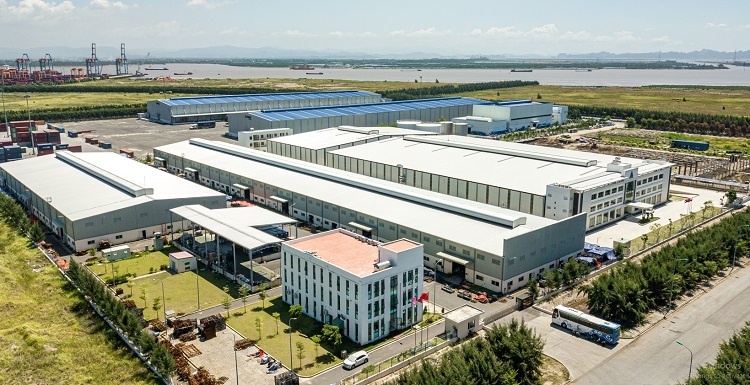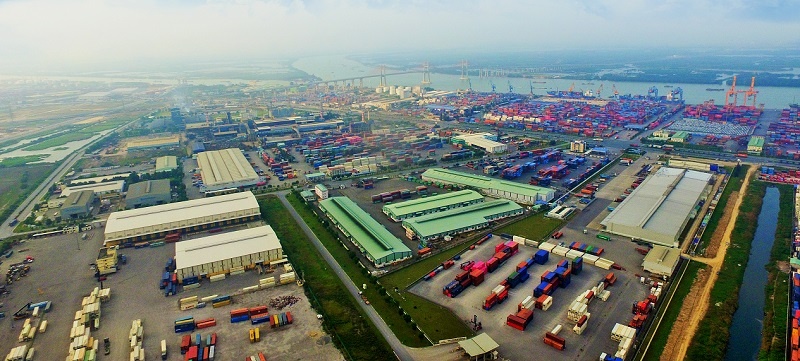Haiphong’s industrial real estate remains attractive destination to investors
 |
| Domestic industrial real estate developers need to improve offerings to attract capital. Photo: Nam Dinh Vu IP |
Data from Savills Vietnam in 2020 shows that the occupancy rate of industrial parks (IPs) in Haiphong has hit 73 per cent with rental prices reaching $96 per square metre per lease cycle, up 3.2 per cent compared to 2019. This is higher than Bac Ninh ($95), Hung Yen ($83), and Hai Duong ($76).
Although rents are rising, investment has been constantly pouring into the city. Discussing this, director of Savills Hanoi Matthew Powell said: “The market excitement, the sudden demand increase for industrial land can be explained by better development of infrastructure and accessibility to new locations, roads, piers, and airports.”
Sharing a similar opinion, general sales, marketing director of DEEP C Industrial Zones Koen Soenens said when foreign partners invest abroad, they look for a suitable, safe, and long-term location because of the large capital requirement to move a factory.
Therefore, many high-quality IPs in Haiphong such as DEEP C, Trang Due, Nam Dinh Vu, Nam Cau Kien could still welcome new projects, even amind the COVID-19 pandemic.
Haiphong currently draws large investment in transport infrastructure, creating a complete logistics chain to become part of the global logistics chain with Cat Bi International Airport and Lach Huyen International Deepwater Port. This is increasing the city's appeal to foreign investors. For example, LG Group has increased its capital by $750 million in February and an additional $1.4 billion at the end of August.
“LG Group will expand its scale further when Trang Due IP deploys its third phase,” said Dang Thanh Tam, chairman of the Board of Directors of Kinh Bac City Development JSC (KBC).
 |
| DEEP C Industrial Zones in Haiphong |
Greater quality drives prices up
According to Haiphong EZ Management Board, enterprises have forecast that foreign direct investment (FDI) attraction into Haiphong’s industrial zones may reach about $5 billion in 2021. Of this, Sao Do Group registered to attract $1 billion in Nam Dinh Vu IP; VSIP Haiphong Co., Ltd. registered to attract $1-1.5 billion ($500 million in industry, $1 billion in real estate) in VSIP Haiphong; and Saigon-Haiphong IP JSC registered to attract $1 billion in Trang Due IP (exceeding its target).
Preparing for the new wave of capital flows, Haiphong is developing 15 more IPs with an area of 6,200 hectares.
The average rental price of industrial real estate in Haiphong has reached $96 per sq.m per lease cycle, which is relatively high in the northern market. However, "you get what you pay for" – the high rents reflect higher handover standards. Currently, Haiphong’s IPs with high rents are backed with convenient logistics locations, good infrastructure, and many synchronous utilities to serve investors.
According to chairman of the Board of Directors of Shinec JSC, Pham Hong Diep, the rental price of Haiphong’s industrial real estate is only higher compared to previous years, it is fully commensurate with the infrastructure investment rate otherwise. Currently, investments in IP infrastructure is rising due to increased input costsand the rising popularity of the ecological industrial park model.
According to Nguyen Thanh Phuong, general director of Sao Do Group, this trend reflects the demand and supply in the market. However, infrastructure investors must also create and package products with commensurate quality, especially focusing on developing a new model of industrial real estate. Haiphong's IPs need to leverage the city's seaport and link product development with logistics to increase their appeal to investors.
Towards the new industrial zone model
According to Haiphong Economic Zone Management Board, Haiphong IPs and EZs contribute about 80 per cent of the export turnover and 70 per cent of the industrial production value of the whole city. Haiphong has attracted 570 investment projects, including more than 400 foreign-invested projects in IPs and EZs, creating jobs for about 160,000 workers (including 4,500 experts, managers, and foreign labourers).
Regarding the development orientation of Haiphong IPs and EZs, Chairman of Haiphong People's Committee Nguyen Van Tung affirmed, Haiphong has been driving the development of sustainable IPs, especially eco-IPs, enhancing its competitive advantages in attracting investment and developing a sustainable environment.
Since Vietnam has yet to deploy its first eco-IP, Haiphong has been actively communicating with its sister city in Japan to implement a green IP development programme. The city also immediately applied to join the programme launched by the Ministry of Planning and Investment (MPI) and the United Nations Industrial Development Organization (UNIDO) to be among the first to benefit from it. As a result, DEEP C was approved by the MPI as one of the pilot IPs to transform itself into a global eco-IP.
Currently, there are two IPs being developed into eco-IPs in Haiphong, DEEP C (540ha) and Nam Cau Kien (nearly 270ha). Thus, eco-IP's will account for more than 16.5 per cent of the total area of nearly 5,000ha in 12 IPs in Haiphong.
Head of the Sustainable Development Department of DEEP C, Melissa Slabbaert, said that enterprises in DEEP C Haiphong can benefit from and resonate with sustainability values in fields like chemicals, firefighting, Internet of Things (used to measure the amount of electricity used), rooftop solar energy production, and road construction from plastic waste. DEEP C will continue promoting renewable energy production from solar energy and wind energy. By 2025, DEEP C expects to supply 50 per cent of electricity demand in its IPs from renewable energy.
According to the programme from now to 2025, Haiphong will develop 15 more IPs, attracting an additional $12-15 billion. Following such ambitious targets, the development of eco-IPs will be one of the key points to ramp up Haiphong’s appeal to investors.
What the stars mean:
★ Poor ★ ★ Promising ★★★ Good ★★★★ Very good ★★★★★ Exceptional
Related Contents
Latest News
More News
- Haiphong ignites innovation drive at TECHFEST 2025 (October 13, 2025 | 19:49)
- Haiphong breaks ground on landmark industrial park and LNG power plant (September 28, 2025 | 09:00)
- DEEP C partners with Signify to develop green lighting in industrial zones (August 27, 2025 | 11:01)
- Nam Dinh Vu Industrial Park taps new free trade zone to attract high-quality investment (July 29, 2025 | 14:41)
- Haiphong attracts $15.6 billion in investment (July 16, 2025 | 13:49)
- KinderWorld opens Singapore International School in Haiphong (May 13, 2025 | 14:20)
- Red Flamboyant Festival connecting milestones with ambition (May 13, 2025 | 10:08)
- Haiphong restates its goals with solid fundamentals (May 13, 2025 | 09:57)
- Heroic Haiphong stands tall (May 13, 2025 | 09:38)
- Haiphong’s thrust to go green and digital (May 13, 2025 | 08:00)

 Tag:
Tag:




















 Mobile Version
Mobile Version